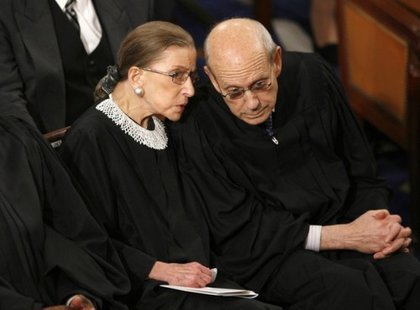Merrick Garland’s cursed voyage in limbo continues; even the prospect of a Trump Supreme Court nominee hasn’t budged Senate Republicans, who care less about getting a qualified nominee than about the potential career consequences if a Supreme Court vote inspires a primary challenger. Merrick’s fate has been especially denigrated because he’s so clearly a qualified appointment. As Michael Gerhardt declared when the nomination was made at Slate, Gerhardt “the nomination of Judge Garland is therefore not a political statement but rather a bold effort to encourage everyone to recognize that if they ever want to see what a merit-based appointment looks like”, they need cast their gaze no further than Merrick Garland.
That formulation is interesting though. So, if you want to see a merit-based appointment, look at Garland. And what do you see when you look at Garland? You see a white guy.
Gerhardt makes this more or less explicit in his piece; Garland, he points out, is not a person of color, nor a woman. He graduated from Harvard Law, which is de rigeur on the court. His appointment does not make a political statement. If Obama had selected a woman, or a black person, it would have been in order to change the gender or racial balance of the court. Since Garland is a white guy, you can be sure his appointment was based, as Gerhardt says, “on merit, not anything else.”
But of course, the very fact that Garland’s white maleness is synonymous with merit is the tip off that “merit” is not, in fact, the only consideration. Or rather, choosing a white man is a deliberate sop. Obama is quite aware that the choice of a non white man would be seen as a provocation, both by Republicans and by neutral serious punditry. To be a woman, or to be a person of color, is to be unusual, special, marked; it means your identity is a statement in itself. White men, on the other hand, are the default; when you choose a white man, you are choosing someone who has no identity, and so can be judged solely on accomplishment and qualifications. It’s natural for white men to be Supreme Court justices; ergo, a Supreme Court justice who is a white man is not chosen for his identity, but for his merit.
There were other reasons to choose Merrick, of course—and they are also linked to his race and his gender. Obama wanted someone who was moderate, to disarm Republican opposition. White men tend to be more conservative than other folks, so looking for a conservative candidate was likely to lead to a white man. Obama also wanted someone older, again to placate conservatives who don’t want a liberal justice sitting for 30 years. Looking for older justices means seeking people from a time when women and people of color had fewer opportunities for career advancement than they do now. Again, that points disproportionately towards white guys.
This isn’t to say that Garland is unqualified. Rather, it’s to point out that his qualifications or lack thereof aren’t separable from his identity. When you want an appointment that says, “quality, and nothing else!” you pick a white guy.



